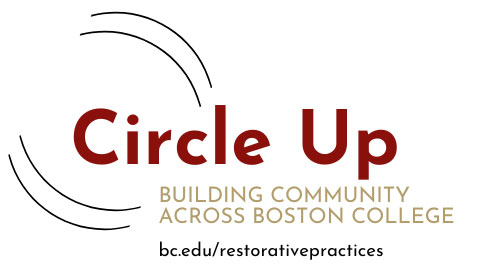Restorative practices promote the creation of spaces of trust and respect, with members of the campus community coming together for difficult conversations, deep listening, and restorative dialogue around community and conflict.
Contact
Maloney Hall 448
617-552-3470
restorativepractices@bc.edu
Restorative Offerings
When harm or conflict occurs, restorative practices offer structured, relationship-centered processes that help those involved understand the impact of their actions, address the needs of everyone affected, and work toward meaningful repair. These approaches emphasize accountability, dignity, and community connection. This initiative was developed to coordinate existing restorative efforts at Boston College, expand opportunities for training and skill-building, strengthen community relationships, enhance the campus climate, and support students in developing self-advocacy and constructive conflict resolution skills.
Key Terms and Definitions
Select a category to view key terms and definitions.
Restorative Practices are a set of tools that we use to help our community strengthen relationships, address conflict, and repair harm when it occurs. Pulling on principles of restorative justice, restorative practices focus on listening, understanding, and problem-solving rather than blame or punishment. These practices promote spaces of trust and respect and can help us build a healthier, more connected campus community.
Restorative Mindset: An approach that centers relationships, shared humanity, and the belief that people grow through accountability and reflection. It emphasizes understanding harm, addressing needs, and strengthening community connections.
Affective Statements: Brief, authentic expressions of how someone’s behavior affects others. They model transparency, encourage reflection, and invite individuals to consider the impact of their actions.
Collaborative Problem-Solving: A structured process in which those involved work together to identify concerns, clarify needs, and co-create solutions. It builds shared ownership and supports lasting resolutions.
Restorative Dialogues are facilitated conversations, typically held in a small setting between two individuals, and are often focused on equal parts listening and perspective-sharing to address lower-level harm/conflict.
Active Listening: A way of attending to others that involves full attention, limited interruptions, and thoughtful responses. It communicates respect and helps participants feel heard and understood.
Perspective Taking: The practice of considering another person’s viewpoint, experiences, and emotions. It supports empathy, reduces conflict, and strengthens relationships.
Intent v. Impact: A reflective principle that distinguishes what someone meant to do from how their actions were experienced. It helps participants acknowledge unintended harm and fosters meaningful accountability.
Community Circles are a way for members of a specific community or folks who are brought together under shared circumstances and situations to come together and engage in a structured, facilitated group conversation. These are powerful tools for building relationships, establishing norms, and working through differences.
Talking Piece: An object used in circles to guide respectful, orderly dialogue. Only the person holding the talking piece speaks, ensuring that every voice has space.
Circle Keeper: The facilitator responsible for guiding the circle process, setting a tone of respect, and supporting balanced participation. The keeper creates structure while allowing the community to lead.
Prompts/Guiding Questions: Purposeful questions that help participants reflect, share experiences, and move conversations forward. They encourage deeper understanding and support constructive dialogue.
Restorative Conferences are the most significant and formal processes in Restorative Practices. These are highly structured and mediated conversations between a harmed party and the offending party. The goal is for the extent of harm to be fully understood and heard and for accountability to be taken to begin repairing harm. It typically concludes with a written agreement of actions that will be taken by the offender(s).
Pre-Conference Preparation: The individual meetings held with participants before a restorative conference to explain the process, assess readiness, and ensure safety and clarity. This preparation lays the foundation for a productive conversation.
Support Person: A trusted individual who accompanies a participant to provide encouragement and emotional grounding. Their presence helps ensure that participants feel safe and supported throughout the process.
Voluntary Participation: A core restorative principle in which individuals choose to engage freely and can decline or withdraw at any time. Voluntary involvement strengthens honesty, accountability, and authentic dialogue.
Non-Violent Communication (NVC) is a process developed by Marshall Rosenberg that can be integrated into daily communication. NVC is centered on reframing and adjusting language to de-escalate, heal, and promote understanding of the impact of one’s actions from an empathetic lens.
Needs Articulation: The process of identifying and expressing what each participant requires to feel heard, supported, or repaired. Clear articulation of needs guides constructive solutions.
Feelings Identification: A reflective practice that helps participants name their emotions and understand their responses to harm or conflict. Recognizing feelings promotes clarity and reduces misunderstandings.
Empathetic Listening: A mode of listening that seeks to understand another person’s emotions and experiences without judgment. It builds trust, reduces defensiveness, and invites deeper connection.
Student-Community Impact
"The community circle we had for our organization was incredibly valuable to me – not only did I have the chance to reflect on my own experiences at BC, but I also walked away with a greater appreciation for the connections I have with others in my community."
-President, Transfer Ambassador Program










